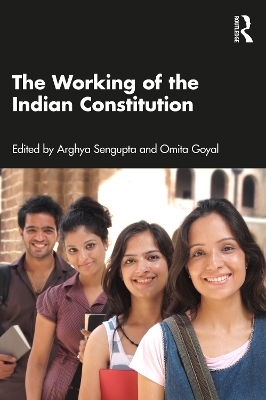
The Working of the Indian Constitution
Routledge India (Verlag)
978-1-032-67159-8 (ISBN)
The Indian Constitution clearly vests power in the hands of its people. This volume critically examines how the longest written national Constitution is made successful by people who take its spirit to heart and let it inform their activities, and how like anywhere in the world, it is a work in progress. It covers a range of debates on issues such as individual freedom (of expression, of association, freedom to lead lives of dignity, etc.), liberty (freedom from oppression), the right to life, right to equality, justice, among several others. The book contains essays by judges, lawyers and academics who describe the journey of the Constitution through doctrine, case-law, and comparative analyses with other countries. At the same time, it also contains essays by doctors, politicians, activists, bureaucrats, and a number of methodologically diverse essays by a host of demographically diverse writers.
The volume will be an indispensable read for scholars and researchers of legal studies, political scientists, governance, public policy, modern history, and South Asia studies. It will also be of immense interest to political scientists, political theorists, legal scholars, historians, lawyers, and general readers interested in the history of the Indian Constitution.
Arghya Sengupta is Founder and Research Director, Vidhi Centre for Legal Policy, India’s premier law and policy think-tank. His areas of research include constitutional law, administrative law and the regulation of the digital economy. He is the author of Independence and Accountability of the Indian Higher Judiciary (2019). He is currently working on a book that explores the origins of the Constitution of India (2023). Prior to founding Vidhi, he studied for his BCL and DPhil as a Rhodes Scholar, and was subsequently a Lecturer in Administrative Law at Pembroke College, Oxford University. Omita Goyal is presently Chief Editor of the IIC Quarterly, Journal of the India International Centre. She started her career in the voluntary sector with the Indian Social Institute, New Delhi. Shortly thereafter, she moved into academic publishing where she has spent close to 40 years. She worked at SAGE Publications India Pvt. Ltd. for 20 years, leaving as General Manager. She took time off to work as a freelance editor for SAGE and other institutions, such as the World Bank, UNICEF, UNDP, Voluntary Health Association of India, Centre for Women’s Development Studies, WHO, Institute of Social Studies. The Hague and TERI. In 2005, she was invited by Taylor and Francis to start a social science programme under their social science and humanities imprint, Routledge, as Publishing Director.
Editorial. Foreword. Introduction PART I: Sovereignty 1. Sovereignty in the Indian Constitution 2. Friend not Foe: Popular Sovereignty in the Indian Constitution 3. Sovereignty and Prevalent Morality: Section 377 of the Indian Penal Code 4. GST and Federal India 5. Development through Participatory Governance: MGNREGA in Meghalaya 6. The Making of a Sovereign People PART II: Socialism 7. Socialism in the Indian Constitution 8. Public Health for All 9. MGNREGA: Towards Realising the Constitutional Objective of Work for All 10. Early Childhood Care and the Right to Education Act PART III: Secularism 11. Secularism in the Indian Constitution 12. Secular, but on its Own Terms 13. Secularism and Indian Elections: A Personal Memoir 14. Communists and the Fulfilment of Secular Promises in West Bengal PART IV: Democracy 15. Democracy in the Indian Constitution 16. Testing Democracy in Sasaram17. Constitution, Corporates and the Costs of Democracy 18. Election Commission of India: The Watchdog of Indian Democracy 19. The Constitution, the Court and Freedom of Media PART V: Republic 20. Republic in the Indian Constitution 21. The Constitution and Religious Minorities: A Comparative South Asian Perspective 22. Beyond Rhetoric: Transgender Persons and Socio-Economic Inclusion 23. Women, Law and the Constitution 24. Particularly Vulnerable Tribal Groups in South India: From ‘Backwardness’ to ‘Poverty’ 25. Karnan: Caste and the Constitution in Tamil Nadu
| Erscheinungsdatum | 26.07.2024 |
|---|---|
| Verlagsort | London |
| Sprache | englisch |
| Maße | 156 x 234 mm |
| Gewicht | 544 g |
| Themenwelt | Geisteswissenschaften ► Geschichte |
| Geisteswissenschaften ► Philosophie | |
| Sozialwissenschaften ► Politik / Verwaltung ► Politische Systeme | |
| Sozialwissenschaften ► Politik / Verwaltung ► Staat / Verwaltung | |
| Sozialwissenschaften ► Soziologie ► Spezielle Soziologien | |
| ISBN-10 | 1-032-67159-9 / 1032671599 |
| ISBN-13 | 978-1-032-67159-8 / 9781032671598 |
| Zustand | Neuware |
| Haben Sie eine Frage zum Produkt? |
aus dem Bereich


